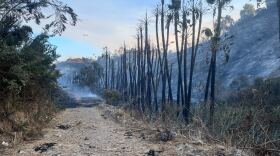Researchers have begun testing a vaccine engineered to fight the new H1N1 swine flu that first appeared in the spring. The tests are being done quickly, in a race to have something available before a possible fall outbreak.
At the University of Maryland in Baltimore and seven other sites around the country, volunteers began receiving a new vaccine against H1N1 swine flu on Monday. They are the first volunteers in a government trial that will eventually include 2,800 people.
Landscaper Lorenzo Thornton, 48, is one of the volunteers. He says he is not the least bit worried about being in a vaccine trial. "I've got a pretty strong immune system," he says. Though Thornton will get paid for participating, he says he's not in it for the money.
"Whatever they can find out from me, if it gives me any kind of reaction, maybe it could help someone else," he says.
Thornton has to first sit through a 40-minute orientation to learn about the risks he might be taking. Dr. Wilbur Chen of the University of Maryland Center for Vaccine Development gives the talk. And last Friday, as soon as the vaccine arrived, Chen got a shot himself.
Chen tells the volunteers that the trials are moving fast because the virus itself is moving fast.
"It only took about a month for us to have it spread from Mexico to our Southern states. And then from that, only 10 days later did we start confirming these cases in California, Kansas, New York, Ohio, Texas," says Chen. "And at that time, that's when our nation's health and human services declared a public health emergency."
Chen also told the volunteers that they shouldn't expect to get the flu.
"The vaccine, you should know, is a killed virus, so you're not going to be able to get the actual flu from it, although you may get flu-like symptoms," Chen says.
Volunteers will be checked closely for any side effects. They'll also be monitored for Guillain-Barre syndrome, which was reported in people who received a swine flu vaccine 33 years ago. It's a rare syndrome usually triggered by a viral infection, and no one knows for sure if the vaccine is also a trigger.
Dr. Karen Kotloff is heading the University of Maryland trials, and her team is racing to test the vaccine's safety and effectiveness before a potential major outbreak of H1N1 in the fall. "Coming I think in September, there's going to be an increase, and I think it will become much steeper come November or December," Kotloff says.
If the vaccine turns out to be safe, government officials say they'll have it ready for distribution in mid-October. Kotloff is confident about the vaccine's safety because of the long safety record of seasonal flu vaccines.
"We have no scientific basis for thinking that this vaccine will behave any differently," says Kotloff. The vaccine is prepared and formulated like the seasonal influenza vaccine that many people take each year.
She says that at the University of Maryland, they'll give about 400 shots in the next week.
"Eight days from then, we'll have the earliest blood sample to see what a single dose does. Two weeks after that, we'll know what a single dose at the two strengths can do," she says.
In a matter of weeks, researchers will have more data about how many doses of the vaccine are needed to be effective. If people need two shots of the new H1N1 vaccine, this could prove a challenge if there's not much available this fall.
Copyright 2022 NPR. To see more, visit https://www.npr.org. 9(MDAzMjM2NDYzMDEyMzc1Njk5NjAxNzY3OQ001))







